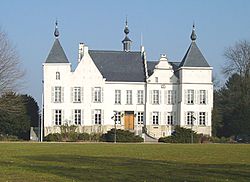Wemmel facts for kids
Quick facts for kids
Wemmel
|
|||
|---|---|---|---|

Wemmel Castle, former residence of the Marquess of Wemmel, now Town Hall.
|
|||
|
|||
| Country | Belgium | ||
| Community | Flemish Community | ||
| Region | Flemish Region | ||
| Province | Flemish Brabant | ||
| Arrondissement | Halle-Vilvoorde | ||
| Area | |||
| • Total | 8.74 km2 (3.37 sq mi) | ||
| Population
(2018-01-01)Lua error in Module:Wd at line 1575: attempt to index field 'wikibase' (a nil value).
|
|||
| • Total | Lua error in Module:Wd at line 1,575: attempt to index field 'wikibase' (a nil value). | ||
| Postal codes |
1780
|
||
| Area codes | 02 | ||
| Website | www.wemmel.be | ||
Wemmel is a town in the province of Flemish Brabant, located in the Flemish region of Belgium. It's a smaller town, covering about 8.74 square kilometers (about 3.37 square miles). As of January 1, 2018, around 16,347 people lived there.
Even though Wemmel is outside the main Brussels-Capital Region, it's often seen as part of the Brussels suburbs. This is because it's right next to Brussels neighborhoods like Jette and Laeken. The main highway around Brussels, called the ring, even goes through the southern part of Wemmel.
Contents
A Look at Wemmel's Past
The town of Wemmel first grew up around the Sint-Servaaskerk, which means the Church of Saint Servatius. This spot was chosen because the ground was good for building. Around the year 370, a group called the Franks took over the area. Before them, the Romans had lived there since about the 2nd century AD. Later, Wemmel became part of the Duchy of Brabant, which was an important region in history.
Early Lords of Wemmel
One of the first known leaders, or "lords," of Wemmel was Goswinus van Wembelne. He lived in the early 1100s. His family continued to be the lords of Wemmel until the late 1100s. Then, a woman named Isabella van Wembelne married Aernout II of Kraainem. This meant Wemmel became part of the large lands owned by the Kraainem family.
Many important people came from this noble family. For example, Aernout III died fighting for the French king in the Battle of the Golden Spurs. His son, Leo, was a very skilled diplomat. He helped sign a treaty in 1366 that settled a big disagreement between the County of Flanders and the Duchy of Brabant.
The Marquess of Wemmel
Later, Leo's granddaughter married Gyselbrecht Taye, who was the lord of Elewijt. This changed who ruled Wemmel again. It then belonged to the famous Coudenbergh family from Brussels. This family ruled Wemmel as it became more important, first as a "barony" and then as a "margravate." They lost power in 1792 when France invaded the area during the French Revolutionary Wars.
Through a marriage, the Van der Noot family took over the power and castles in Wemmel. Members of this family were important in the Brabantian Revolution, a fight for independence.
Wemmel Castle Becomes Town Hall
In 1838, all the ruling family's lands in Wemmel were sold to William Bernard of Limburg-Stirum. He then became the mayor of the town. Two of his daughters lived in Wemmel Castle until 1926. After they left, their family gave the castle to the town. Since then, Wemmel Castle has been used as the town hall, where the local government works. The castle was fully made new again in 1992–1993.
Languages Spoken in Wemmel
The official language in Wemmel is Dutch, just like in all of Flanders. However, in 1954, special rules were made to help people who speak French. This was because an official count in 1947 showed that more than 30% of the people in Wemmel spoke French.
These special rules mean that French-speaking residents can ask for official papers from the town in French. Also, since Wemmel is part of a legal and voting area that uses both Dutch and French, French can be used in court. Some schools for young children also teach in French.
Places to See in Wemmel
See also
 In Spanish: Wemmel para niños
In Spanish: Wemmel para niños
 | Shirley Ann Jackson |
 | Garett Morgan |
 | J. Ernest Wilkins Jr. |
 | Elijah McCoy |








